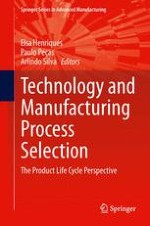2014 | OriginalPaper | Buchkapitel
Material Flow Cost Accounting: A Tool for Designing Economically and Ecologically Sustainable Production Processes
verfasst von : Ronny Sygulla, Uwe Götze, Annett Bierer
Erschienen in: Technology and Manufacturing Process Selection
Verlag: Springer London
Aktivieren Sie unsere intelligente Suche, um passende Fachinhalte oder Patente zu finden.
Wählen Sie Textabschnitte aus um mit Künstlicher Intelligenz passenden Patente zu finden. powered by
Markieren Sie Textabschnitte, um KI-gestützt weitere passende Inhalte zu finden. powered by
